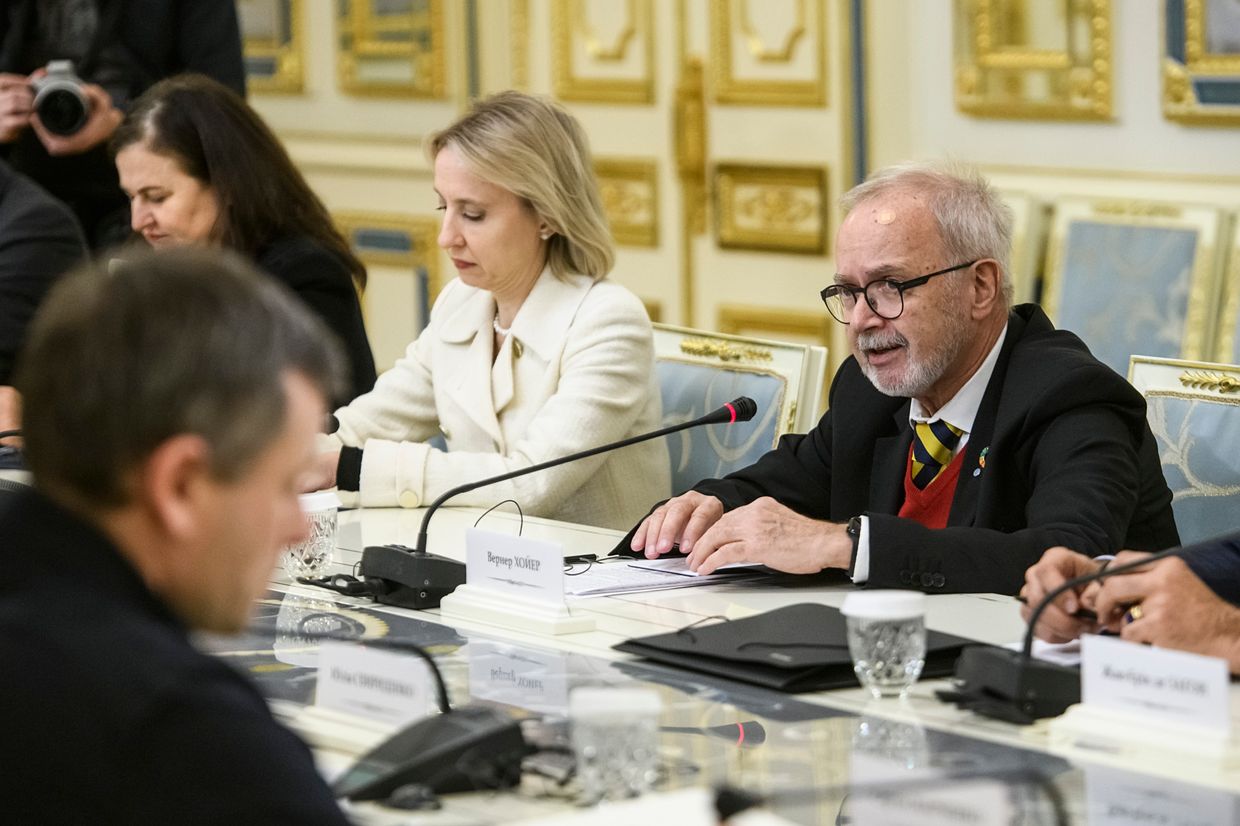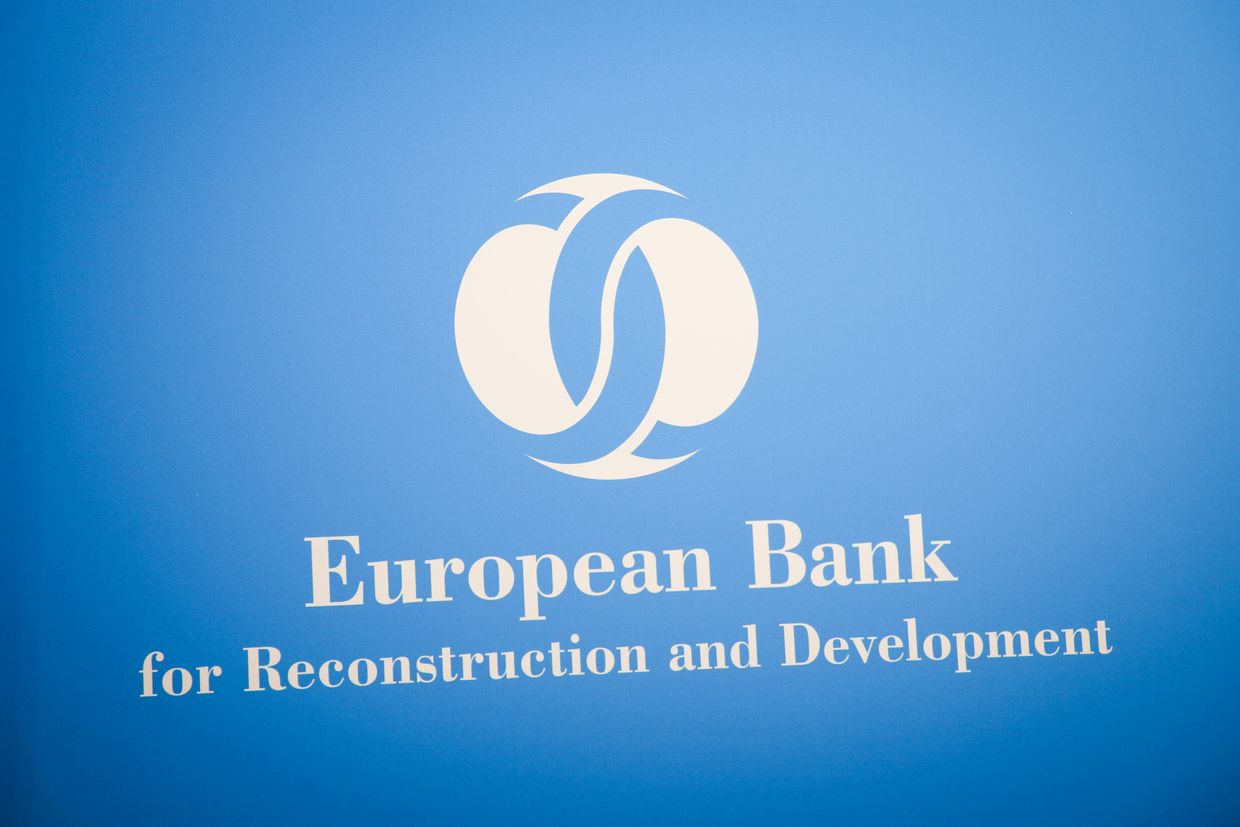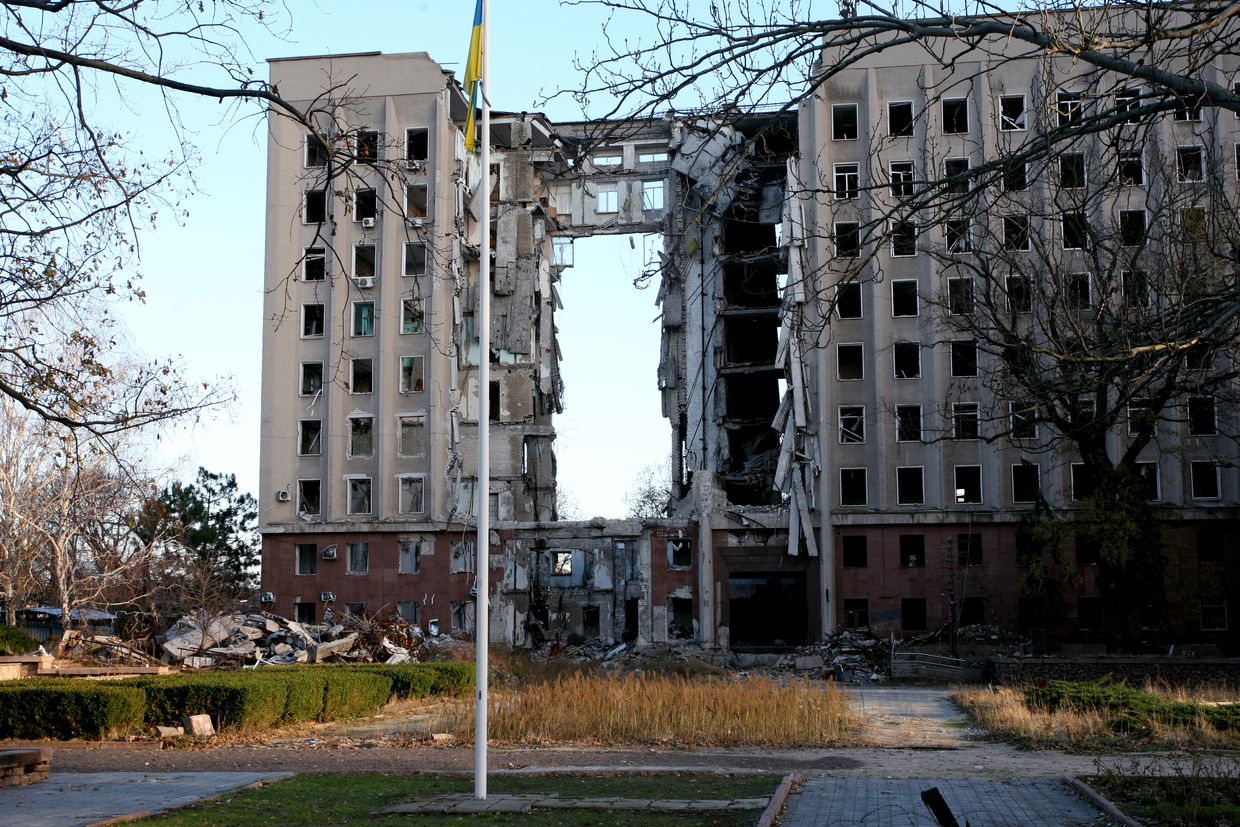Reconstruction in Kyiv suburb sabotaged by local officials, discouraging foreign investors

In a dark corner of his makeshift shack, Oleksandr Mazay unveils a hand grenade wrapped in a dirty blanket. He smiles and pulls the pin.
Fortunately, the explosive is rusted and inactive. Once belonging to a Chechen soldier, Mazay kept the grenade as a reminder of the brutal occupation he endured at the very start of the invasion in his hometown Hostomel, one of Kyiv’s northern suburbs.
On Feb. 24, 2022, Russian forces landed at the Antonov Airport, less than a kilometer from Mazay’s home. He became one of the first Ukrainians to experience the full force of Russia’s full-scale invasion, surviving a month-long battle that damaged or destroyed nearly 40% of Hostomel — including his apartment.
When the French construction waste recycling company Neo-Eco announced plans to rebuild his apartment block as part of a pilot reconstruction project, Mazay was thrilled. He says he understands that the government's main focus now is on the war effort and that the level of destruction is widespread across the country.
“The fact that the invaders were among the first to come to us is true, but we are not the only ones who suffered. If any organizations can help us in this matter, we will be very grateful,” he told the Kyiv Independent.
But Neo-Eco soon hit a brick wall, hindered by Hostomel’s questionable administration and forced to suspend the project. Since Russian forces killed the mayor in March 2022, the city is now run by a military administration and elections for a new civilian head can only take place after the war when martial law is lifted.
While reconstruction and developments in neighboring Bucha and Irpin have been the subject of publicity in Ukraine, the streets of Hostomel don’t look far from the state they were in 20 months ago where damages amount to $343 million, according to the Ukrainian government.
Foreign companies are eager to invest and contribute to the recovery process but have been put off by the town’s ruling military administration which is facing several allegations of misappropriating and stealing funds.
A state-led investigation into the administration uncovered over half a million U.S. dollars in appropriated funds while local journalists found dodgy companies had been given construction contracts.
Mazay has already taken matters into his own hands by building a small house above his carpentry workshop. With his large beard and mellow demeanor, he has a monk-like aura, content in his humble home constructed from wood found around his war-torn neighborhood.
But it's a different story for his neighbors. Waiting for their apartments to be rebuilt, many have left town to find temporary accommodation elsewhere, including camps for internally displaced people (IDPs) funded by Poland.


Stifled ambitions
Two street dogs chase each other up and down mounds of carefully separated rubble. It’s hard to imagine five apartment blocks housing 200 units used to stand in its place.
It took Neo-Eco 10 weeks to disassemble the war-damaged Soviet-era buildings and sort through the materials to see what could be used for future reconstruction.
As part of the company’s work recycling rubble, a team of up to 20 workers usually crushes bricks and concrete, and separates the iron, before sorting again and repeating the crushing process two or three times. The materials can then be used to produce new concrete and granulated stone.
The French company’s goal is to make sure chemicals like asbestos and other harmful substances don’t end up dumped in fields, which is often the case and can potentially cause untold environmental damage for years to come.
“To be honest, it's not rocket science,” Kyrylo Chernyshuk, head of Neo-Eco’s Ukraine project told the Kyiv Independent.
“In a typical Soviet building, 80% of the material is concrete and bricks. It's very easy to recycle.”
In the case of the apartment buildings in Hostomel, Neo-Eco workers wearing biohazard suits combed through the debris, removing everything from rotting food left behind in fridges to deadly asbestos, which was then taken away by a licensed company.

Initially, the company was just supposed to deconstruct the buildings. But in October last year, the Kyiv Oblast administration asked if they could construct new apartments as well. Neo-Eco agreed, managing to collect 30 million euros from private donors.
Problems soon emerged with Hostomel’s military administration over leasing the land. While Neo-Eco secured permits for the disassembling phase, the administration was uncooperative when it came to allocating construction permits.
Instead, the administration wanted Neo-Eco to hand over the project’s funding and assignment of the apartments to them, which the company didn’t want to do. Having previously sensed something was afoot, the company requested the administration sign a framework agreement to retain control over their development.
They waited for six months but the administration never signed the agreement. With the project stalling, Neo-Eco held a meeting with the military administration, residents, and Kyiv Oblast administration and eventually relinquished control of the project to the Hostomel administration.
“We gave them an ultimatum saying 'If you're not very willing to sign it, we have to stop the project.' They were more than happy for us to stop rather than continue, which was a little bit of a surprise,” Neo-Eco’s project director in Ukraine Bart Gruyaert told the Kyiv Independent.
The residents were unhappy with the decision, wanting Neo-Eco to continue the project and help restore life to the town as quickly as possible. Mazay believes that rebuilding the apartments from scratch will now take two or three years longer under the administration than it would have with Neo-Eco.
While several partially damaged apartment blocks have been repaired under the Hostomel administration in a separate development, one resident, Mykola, who declined to give his last name, told the Kyiv Independent that he had to wait nearly 18 months. He doesn’t know why it has taken so long.
“(The administration wasted time) looking for saboteurs. As if we had such people living among us,” he said wearily.
For now, the 50,000 metric tons of material that Neo-Eco recycled in Hostomel, which is worth up to 800,000 euros, sit unused. Although Neo-Eco offered to stay on as consultants, the Hostomel administration told the Kyiv Independent they have no plans to rebuild in accordance with the company’s original plan.
Gruyaert believes the administration will either use the materials in other rebuilding projects or sell them. Residents have already informed Neo-Eco in a WhatsApp group that two trucks extracted materials from the piles.
“There are not many companies currently during the war doing boots-on-the-ground reconstruction work. I find it a pity that if there are not so many, why make our life difficult and throw mud on those few that are there,” Gruyaert said.
Neo-Eco has since stepped away from further projects in Kyiv Oblast and has warned other companies from working in the region. Instead, it’s looking towards projects in Chernihiv and Mykolaiv Oblasts where the company says cooperation has been more successful.
Dodgy dealings
The Hostomel military administration has come under fire in recent months for numerous acts of misconduct. The State Audit Service of Ukraine reported on Dec. 4 that violations relating to reconstruction projects between 2022 and 2023 amounted to Hr 21 million ($567,000).
In one such case, the Kyiv Oblast administration allocated almost Hr 11 million ($300,000) worth of materials to Hostomel for repairs. Instead, the military administration misappropriated the materials, leaving 100 homes unrepaired despite claiming the work was carried out.
“Funds were allocated for restoration, and contractors quickly seized them, ‘forgetting’ to fulfill their main obligations — to repair or rebuild destroyed homes,” said the Head of the State Audit Service Alla Basalayeva, adding that the funds were “simply misappropriated.”

One Hostomel resident, Natalia Lyz, told the Kyiv Independent that many in the community have been left to fend for themselves. Her small apartment was heavily damaged by blast waves and occupied by Chechen troops that left her home in tatters.
“There was human shit everywhere,” she said, pointing to the shower and bathroom floor.
Lyz had to clean the place herself and replace what was stolen. Another resident helped her find a new front door taken from an abandoned apartment, although the handle is precariously loose.
With little money to properly fix her home, she has been forced to live in difficult conditions. The bare, concrete walls struggle to keep in the heat. Several wooden planks are stacked in the hallway which Lyz said she may try to fasten to her wall for insulation.
Alternative avenues
Plucky international companies understand the urgency of reconstructing Ukraine’s devastated settlements and building back people’s homes, despite the risks of unsavory local administrations like the one in Hostomel.
But they also express concerns over the governmental systems in place to improve transparency.
The main tool is the public procurement platform ProZorro, launched in 2016. It aims to streamline the process for companies to participate in bids for state projects and track the entire procurement process electronically.
Foreign investors have highlighted major issues with the platform, namely that contractors are frequently pre-determined and the competition can be a charade. In several cases, Hostomel tenders were allocated directly without an auction, according to Transparency International.
Gruyaert told the Kyiv Independent that a group of European companies “calculated that there were about 90 tenders that various (foreign) companies participated in and all of them were lost.”
“It was always based on the criteria of price or technicality or incomplete documentation and then often we discovered that in fact, it was already pre-assigned to somebody.”
At the same time, the administration in Hostomel has given contracts to local companies unrelated to the field of construction. An investigation by the Ukrainian outlet Bihus, published on June 5, found that Hostomel’s administration had assigned reconstruction contracts without sufficient background checks or fair competition.
In one case, Hr 300,000 ($8,100) was assigned to Yaroslav Morozov, a man living in occupied Donetsk with no apparent experience in reconstruction work.
For some investors, it is preferential to opt for their own procurement process instead. The Nordic Environment Finance Corporation (NEFCO) has its own rules in place agreed with the Ukrainian government back in 2010, which is more efficient and transparent than ProZorro, Senior Advisor of NEFCO Ronny Nilsson told the Kyiv Independent.
The fund will allocate two million euros in EU financing to reconstruct Hostomel’s water infrastructure directly to local partners, rather than handing money over to the military administration. NEFCO has also taken extra precautions as they consider the town a medium-risk zone due to the military administration.
“If the project has a medium risk level, then the project can only be implemented with mitigating actions,” Nilsson explained.
“There is a consultant taking part in pre-tender meetings and all the contacts between the military administration’s project implementation unit and contractors and tenderers.”
More countries may follow this path and implement their own procurement rules, Gruyaert believes. While this could attract more European companies to participate in Ukraine’s reconstruction, he warns that it might create a parallel system to Prozorro which favors European companies over Ukrainian ones.
Ultimately, countries will likely opt for a system in which contracts will go to European companies and benefit their own countries rather than be involved in a corruption scheme or disappear, Gruyaert said.
Some luck with NGOs
In the small village of Horenka, within the Hostomel municipality, a rebuilt kindergarten boasts a new roof with solar panels. Concerned that reconstruction projects would ignore environmental policies, Greenpeace Ukraine initiated a program in the liberated towns of Kyiv Oblast.
The NGO works alongside the Hostomel administration to determine which buildings need attention first and implement environmental reconstruction, namely solar panels. Finances come from their own fund as well as Greenpeace Germany and the German NGO Arche Nova.
“The reconstruction of Ukraine should be in a greener way. It shouldn't just be reconstruction, but modernization,” Partnership Coordinator at Greenpeace Ukraine Polina Kolodiazhna told the Kyiv Independent.
Despite being aware of the administration’s corruption allegations, she says the organization has faced no issues. Rather she has found them to be open and eager to implement renewable energy projects.
Kolodiazhna mentions that this is likely due to the NGO directly paying partner companies to install the solar panels rather than the money passing through the administration.

But Gruyaert emphasizes that Ukraine needs foreign companies to help with reconstruction, something which has been echoed by Ukrainian officials including the Head of Ukraine’s State Agency for Restoration and Infrastructure Development Mustafa Nayyem.
While being initially optimistic that Kyiv would ramp up its anti-corruption efforts, Gruyaert fears corruption may be increasing and put off foreign companies from investing in Ukraine.
For Mazay the answer to Hostomel’s reconstruction is simple: “The more publicity, the less corruption. The more transparency, the less corruption. People don't change, so you have to somehow find a way around it.”
The Kyiv Independent's business editor Liliane Bivings contributed reporting to this story.














